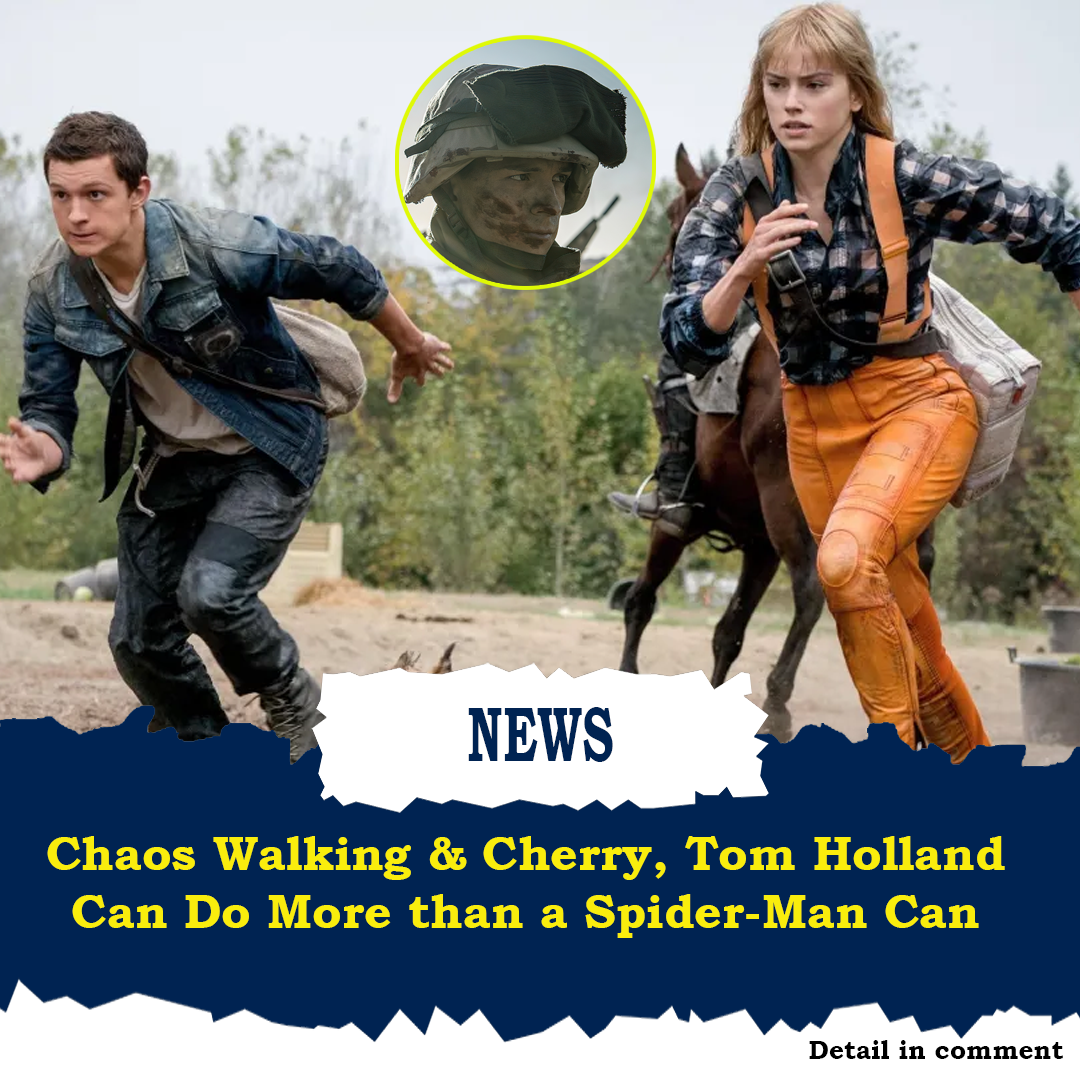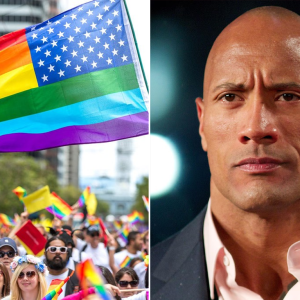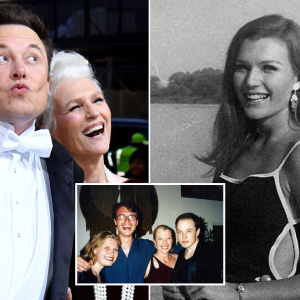
Every young actor pigeonholed as a particular character, superhero or serial killer, wishes to break out of such typecasting. In the case of Tom Holland, Spider-Man is such a role, a great protagonist meant for mass audience satisfaction and therefore mostly scrubbed of unsavory elements or inscrutable traits. So it is that recently he’s sought out more adult fare and certainly more daring roles in the likes of The Devil All the Time and, this month, a two-for-one deal with Doug Liman’s delayed science fiction yarn Chaos Walking and Joe Russo’s war-and-drugs epic Cherry. Both films tackle toxic masculinity to varying success, placing Holland front-and-center as an avatar for young men who have only been taught how to “be a man” instead of how to be a simple human being.

Chaos Walking, yet another Doug Liman production debacle wherein on-set hang-ups, reshoots, and endless delays had labeled the film a flop before it even fell into theaters. Such infamous stories often tempt film critics into wanting to hate what they’re watching, overwhelming a more level-headed judgement call and rendering them as reliable as any rando on Twitter. Chaos Walking is no perfect film nor is it altogether very original, but it is a handsomely-made, well-acted, thematically urgent, and often entertaining adventure yarn set entirely on an alien planet colonized by Earthlings. As Todd Hewitt, a curious, insecure, wannabe-man’s man of a farm boy, Holland is excellent at conveying the good underneath a couple decades’ worth of bad teachings from his community, a male-only village ruled by David Prentiss (Mads Mikkelsen), one of a few who can control what they call “the noise.”
Initially a headache-inducing nuisance before becoming par for the course, the noise is a telepathic by-product of the planet’s atmosphere. Somehow, every man who sets foot on this land has their every thought and feeling broadcast for all to see, seen as sparkling waves emanating from their heads and/or bodies, as if thoughts were energy that could not be contained. Some, like Prentiss and a fire-and-brimstone preacher (David Oyelewo), use their control of it to control those around them. Most, like Hewitt, cannot control it and are a slave to their every waking thought and what it tells everyone around them. When a ship crash-lands nearby, the village is thrown into disarray as Viola (Daisy Ridley) finds herself the only woman in town, and in a world where men’s thoughts are everywhere and her thoughts are nowhere. Women aren’t affected by the atmosphere, and therefore social chaos ensues.
Holland and Ridley share an indelible chemistry, in spite of the film’s intentional lack of a true romantic subplot. Unlike so many other young adult adventures, Chaos Walking avoids pairing the two of them romantically, even if Todd harbors a crush that he can’t hide. From Hewitt’s constant refrain to himself “be a man” to his stubborn insisting on wrestling an octopus for dinner, Todd is like so many men, raised and bred to feel shame about feelings and pride about a particular brand of violence. His mother was killed when he was young and his father (Demian Bichir) has tried his best in her absence, but Prentiss has curated an almost cult-like following among the villagers, and Todd is no exception in looking up to him. That is, until he meets a girl for the first time. Learning the truth about Prentiss and wanting to help her, Todd and Viola trek across the planet’s harsh and unforgiving landscape to find a beacon for signaling her fellow travelers who are waiting above.
Long, difficult, linear journeys through lush jungles and dangerous terrain are catnip for me. They’re a perfect opportunity to learn about characters, to see them bond or break whilst encountering obstacles on their way to salvation. Chaos Walking dispenses with editing tricks, forcing the audience to follow along as these two fugitives try to escape the clutches of Prentiss and preacher on their tail. While the film does commit a cinematic faux pas that I typically cannot forgive, one at the hands of that psychopathic, misogynistic preacher, the incident is used as another building block for Todd’s growth, his response to it a quite moving example of the very real toxicity that so often accompanies traditional masculinity. Holland is great at imbuing childish behavior with immense empathy, and Todd Hewitt might be the best example yet of these innate talents.

In less than two weeks, Tom Holland has waged a significant campaign for a good career long after Spider-Man. More so than Chaos Walking, Cherry is a prime example of his recent endeavor to get out from under the webslinger’s shadow. This is an ambitious, swing-for-the-fences social epic bolstered by a tour de force performance from his truly. Though the film occasionally employs one too many gimmicks or hews too closely to misery porn in its second half, the Russo Bros have proven here they are much more than Marvel lap dogs, and Holland instantly places himself among today’s best working actors.
Cherry is both a star vehicle for Tom and an examination of the social ills and luck-of-the-draw that lead to opioid addiction in the United States. It’s not so much a film about the opioid epidemic as it is a film about the sociological arc that has befallen so many men, those caught in the crosshairs of toxic masculinity. It’s also a love story, perhaps the most successful element of its six-chapter saga. The Russos manage to avoid biopic-like pitfalls as they track Holland’s troubled character, Cherry, from bright-eyed college student to junkie bank robber, giving equal weight to every seminal event without truncating or skipping over significant chunks of time. Adapted from a book of the same name, Cherry is one of a precious few motion pictures to mimic the the feeling of a book unfolding and succeed at doing so. Its novelistic structure and sprawling narrative convey the scope of a dense little book without irredeemably dragging out the runtime.
Coupled with a movingly ethereal score by Henry Jackman and crisp, vivid cinematography by Newton Thomas Sigel, Cherry is a complete package technically speaking. The problems are few and far between, if notably obvious, such as a wayward wig used for Holland’s scenes before and after Cherry joins the Army. Haircuts are a headache for production, often forcing producers to structure shooting based on hair alone. This may seem impractical or unreasonable, but it’s an inconvenient truth that real hair will always trump a mostly unnecessary wig, and productions ought to move mountains to keep real hair on screen. Occasionally, the Russos’ approach borders on self-conscious, as they employ a litany of stylistic flourishes in a seemingly desperate attempt to prove they’re more than competent members of the Marvel/Disney machine. When they don’t work, they look like gimmicks, such as the now-cliched use of classical music for “important” dramatic effect. Fortunately, most of them work, such as freeze-framing a dolly or sneaking funny sight gags into the myriad of banks that are burglarized by Cherry.
Contrary to popular belief, Holland isn’t miscast. It’s evident from the first stanza Cherry is meant to personify every upper-middle class university undergrad who’s neither a virgin nor a very skilled ladies man, neither a schmuck nor a rebel, a young man beset by his own expectations for himself and the world around him. In other words, he’s an everyman, and even they can succumb to life’s obstacles. Is there a better choice for inhabiting bright-eyed everymen than Peter Parker himself? Like many young men, Cherry is slightly aimless and uncertain of his future, he has a void that needs filling, and he finds it in Emily. As we’ve seen in Spider-Man: Homecoming and Chaos Walking, Holland can do lovestruck in his sleep, so he easily could’ve slept-walk through half of his role. He doesn’t, he and newcomer Ciara Bravo make you believe in their instant connection, the intangibility of love. They share great chemistry (Holland is making a habit of it) and, though the relationship is lost a bit, perhaps taken for granted once the needles hit the fan, the Russos and writer Jessica Goldberg make sure the payoff is worth it. Bravo is an excellent find, able to imbue such an innocent face with a secret in her eyes: she’s not the perfect girl next door.
The entire ensemble is well-cast, with Forrest Goodluck a dead-ringer for townie James Lightfoot, Damon Wayans Jr. following in his father’s “Payne” footsteps as a funny drill sergeant, and as pop-collared drug dealer Pills, Jack Reynor continuing his niche of perfectly inhabiting a cowardly douchebag. But it’s Holland who never misses a beat through two-and-half-hours of character development. In fact, he’s rarely if ever off-screen. It’s a difficult task to ask of a twenty-four year-old actor, to follow a character from college student to Iraq war hero, PTSD to pill junkie and heroin addict. More importantly, he never lets us forget the toll that lost time wreaks upon those who don’t believe in their own future. That void is what keeps him going as he seeks fulfilment, often in the wrong places. The men in his life only exacerbate his self-destructive whims, whereas the only lady in his life is his saving grace, for a while anyway. The thing about toxic masculinity is it never spares the women in its orbit.

In a different time, one less beholden to the social media whims of Film Twitter or the predictable tastes of many film critics, Cherry and Chaos Walking would perhaps enjoy a wildly different reception. Regardless of one’s opinion of the films themselves, one truth is unimpeachable: Tom Holland is here to stay as a movie star and serious thespian, and this pair of performances exhibit his range, charisma, and expertise at inhabiting the dangerous insecurities of traditional and/or modern masculinity. Unlike other comic-book stars before him, he’s unlikely to be typecast going forward. In a different year, in a different calendar, one less malformed by strange Oscar eligibilities, his performance in Cherry might be seriously considered for trophies.







